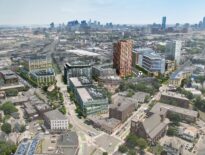Bo Menkiti
Founder and CEO, The Menkiti Group
Age: 46
Industry experience: 20 years
For two decades, The Menkiti Group has successfully found opportunities in emerging neighborhoods in the Washington, D.C. region, where it’s developed more than 3 million square feet of real estate. Now its founder and CEO, Somerville native Bo Menkiti, is focusing on Worcester as the company’s next growth focus. Menkiti’s father, the late Wellesley College professor Ifeanyi Menkiti, purchased a vacant historic building at 6-8 Chatham St. in Worcester in 2015, and Menkiti Group completed the 24-unit Chatham Lofts apartments in 2021. In August, the firm achieved a milestone in its highest-profile project in Massachusetts to date, when the Worcester Redevelopment Authority selected it to redevelop the former Denholm & McKay department store property across from City Hall as a 233-unit apartment complex.
Q: What initially spurred Menkiti Group’s investment in Worcester real estate?
A: My father, who was a professor at Wellesley College, was also what I think of as an immigrant real estate investor, who bought a few small properties in Cambridge and Somerville and Worcester. So, I originally got introduced to Worcester to help my father, and got the opportunity to meet some of the folks in local government. Over time, we saw an opportunity to bring things to life.
Q: What are Menkiti Group’s investment strategies and business model?
A: We are very invested in Worcester and want to continue to execute on that plan, which is part of a neighborhood investment model. We like to look at cities that have strong macroeconomic and demographic fundamentals with growing populations. Main Street in Worcester has always had this negative connotation, but there’s the Theatre District near City Hall and an opportunity to extend downtown Worcester south along Main Street. That’s the type of dynamic where we like to play in, where there’s an opportunity to highlight the existing assets in a neighborhood that has historically been overlooked.
Q: How important is adaptive reuse as a part of Menkiti Group’s development strategy?
A: It’s been a big part of the business. We also have done some new construction here in D.C. as well. We started out doing a lot of rehabs of homes and small apartment buildings and expanded into large-scale mixed-use developments.
Q: How challenging are the prospects for obtaining condominium financing for future projects?
A: It’s very market-specific. The financing environment right now is challenging across the board for every type of project, given where interest rates have gone. Everybody is adjusting to a new normal. One thing that’s a big conversation in Worcester is excitement about wanting to see more for-sale condominiums downtown. That’s currently challenging. The prices on a per-square-foot basis are not at a market level that would support rehabs or new construction. The way that has been financed in rentals is the use of historic tax credits and other programs like [the Housing Development Incentive Program] that have been critical to housing production in the Gateway Cities. Those are much more complicated to bring to bear in a for-sale project. All of our work in downtown Worcester has been in a [federal] Opportunity Zone. In all of our work in both D.C. and Worcester, we’ve leveraged either Opportunity Zone financing, New Market tax credits, historic tax credits and some of the local and state programs.
Q: What are the highest rents you’ve seen achieved in Worcester?
A: We’ve seen rents in Worcester starting to approach the $3 per foot range, which is an interesting place where you start to see the new construction costs start to be financeable, depending upon where interest rates are. That’s kind of the tipping point, where the rents can support new construction. When we entered Worcester, rents were 40 percent below Boston, and that has changed a little bit, but it’s still a significantly more affordable market than Boston, which is drawing a lot of folks to that market. There’s considerable amenities and an educated population.
Q: What were MassDevelopment’s goals for the 526 Main St. property that Menkiti Group acquired in July?
A: 526 Main St. is an exciting project from a neighborhood development and catalyzation perspective. It was part of their Transformative Development Initiative and as you move south on Main Street from downtown Worcester, it has historically been underinvested in. This was occupied by a pawn shop, and it just kind of set the tone about how people perceived that section. The goal was to bring something that could animate the street level. We’ll bring back the first-floor retail, and the second story will have some coworking and shared office space that will bring together the small businesses and entrepreneurs and the creative class we’re seeing in Worcester. We’ll have a Worcester maker retail space that will highlight the different goods made in Worcester.
Q: How can your company support other minority-owned development companies and narrow racial disparities in the industry?
A: We’ve been building out our capital platform to support diverse women and minority-owned developers in doing projects around the country. We’ve been taking the learnings and capital our organization has, and using that to support the growth of proven, scale-ready women and minority businesses and have a social impact side to what they are doing in communities. It’s usually structured as a joint venture co-investment. We have not yet publicly announced the projects, but the focus will be on the East Coast and over into Texas.
Menkiti’s Five Favorite Books:
- “What Happened to You,” by Bruce D. Perry and Oprah Winfrey
- “The Advantage,” by Patrick Lencioni
- “The Psychology of Money,” by Morgan Housel
- “Creating a World without Poverty: Social Business and the Future of Capitalism,” by Muhammad Yunus
- “Before a Common Soil,” by Ifeanyi Menkiti




 |
| 

